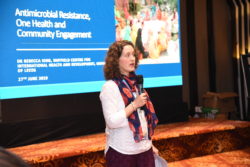Dr Rebecca King
University of Leeds
Profile

Dr Rebecca King trained in Social Anthropology at the University of Cambridge. She worked for several years in the international development sector on livelihoods, food security and health programmes in South Asia and West Africa. Rebecca is an Associate Professor in International Health in the Nuffield Centre for International Health and Development, University of Leeds, and she is currently Head of the Nuffield Centre. Rebecca leads a portfolio of research, which brings together her expertise in participatory community-based interventions, the importance of embedding approaches within the existing health infrastructure, and the critical need to address antimicrobial resistance globally. She is currently leading an MRC-funded study “Community Solutions to Antimicrobial Resistance” (COSTAR), which is exploring the ways in which community dialogues can be embedded into the health system infrastructure to contribute to the prevention and control of antimicrobial resistance in Bangladesh and Nepal. Prior to this she has led UKRI, ESRC and HEFCE-funded studies in related areas, and worked with an AHRC-MRC-funded study in Nepal, which explored the use of participatory community film making to address antibiotic misuse. She co-leads a global network of researchers and practitioners working to address AMR through community engagement (CE4AMR https://ce4amr.leeds.ac.uk/). Rebecca has methodological expertise in applied qualitative health research in international health and has provided expert leadership on the qualitative components of approximately 30 projects in Pakistan, Nepal, Bangladesh, China, Sierra Leone, Ghana, Swaziland, Zambia, Uganda, Mozambique and the UK. Rebecca co-chairs the University of Leeds AMR steering group (Antimicrobial resistance | University of Leeds).
Responsibilities
- Head of the Nuffield Centre for International Health and Development
Research interests
Rebecca is currently leading an MRC-funded study “Community Solutions to Antimicrobial Resistance” (COSTAR), which is exploring the ways in which community dialogues can be embedded into the health system infrastructure to contribute to the prevention and control of antimicrobial resistance in Bangladesh and Nepal COSTAR : Community Engagement for Anti-microbial Resistance (leeds.ac.uk).
Rebecca led CE4AMR: The One Health Approach, which brought together six projects to share experiences of using community engagement approaches to address AMR CE4AMR: The One Health Approach : Community Engagement for Anti-microbial Resistance (leeds.ac.uk)
Rebecca led an ESRC-funded programme exploring the ways in which community dialogues can be embedded into the health system infrastructure to contribute to the prevention and control of antibiotic resistance in Bangladesh. Linked to this, she led a HEFCE-funded project to undertake a major district-wide survey exploring the use of antibiotics amongst humans and animals in rural settings in Bangladesh.
Rebecca also worked with an AHRC-MRC-funded study in Nepal, which explores the use of participatory community film making to address antibiotic misuse Community Arts Against Antibiotic Resistance in Nepal (CARAN) - Herd International. She co-leads a global network of researchers and practitioners working to address AMR through community engagement (CE4AMR https://ce4amr.leeds.ac.uk/).
Rebecca was a Co-investigator on a Department for International Development-funded programme, COMDIS-HSD, which investigates the most effective ways to deliver health services in low- and middle-income countries.
Qualifications
- PhD Social Anthropology, University of Cambridge
- BA Archaeology and Anthropology 1st class, University of Cambridge
Professional memberships
- Fellow of the Higher Education Academy, Feb 2013
- Member of Royal Anthropological Institute, 2010
Student education
Rebecca teaches on a range of undergraduate and postgraduate modules and is interested in supervising students who are investigating areas around community engagement, antimicrobial resistance, and the socio-cultural context of health behaviours in low- and middle-income countries
Research groups and institutes
- Leeds Institute of Health Sciences
- International health research
- Research at the Nuffield Centre of International Health and Development
Postgraduate research opportunities
We welcome enquiries from motivated and qualified applicants from all around the world who are interested in PhD study. Our research opportunities allow you to search for projects and scholarships.
